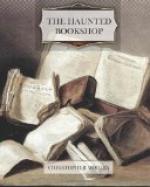“In regard to the War, think what books have accomplished. What was the first thing all the governments started to do— publish books! Blue Books, Yellow Books, White Books, Red Books— everything but Black Books, which would have been appropriate in Berlin. They knew that guns and troops were helpless unless they could get the books on their side, too. Books did as much as anything else to bring America into the war. Some German books helped to wipe the Kaiser off his throne—I Accuse, and Dr. Muehlon’s magnificent outburst The Vandal of Europe, and Lichnowsky’s private memorandum, that shook Germany to her foundations, simply because he told the truth. Here’s that book Men in War, written I believe by a Hungarian officer, with its noble dedication “To Friend and Foe.” Here are some of the French books—books in which the clear, passionate intellect of that race, with its savage irony, burns like a flame. Romain Rolland’s Au-Dessus de la Melee, written in exile in Switzerland; Barbusse’s terrible Le Feu; Duhamel’s bitter Civilization; Bourget’s strangely fascinating novel The Meaning of Death. And the noble books that have come out of England: A Student in Arms; The Tree of Heaven; Why Men Fight, by Bertrand Russell—I’m hoping he’ll write one on Why Men Are Imprisoned: you know he was locked up for his sentiments! And here’s one of the most moving of all— The Letters of Arthur Heath, a gentle, sensitive young Oxford tutor who was killed on the Western front. You ought to read that book. It shows the entire lack of hatred on the part of the English. Heath and his friends, the night before they enlisted, sat up singing the German music they had loved, as a kind of farewell to the old, friendly joyous life. Yes, that’s the kind of thing War does— wipes out spirits like Arthur Heath. Please read it. Then you’ll have to read Philip Gibbs, and Lowes Dickinson and all the young poets. Of course you’ve read Wells already. Everybody has.”
“How about the Americans?” said Titania. “Haven’t they written anything about the war that’s worth while?”
“Here’s one that I found a lot of meat in, streaked with philosophical gristle,” said Roger, relighting his pipe. He pulled out a copy of Professor Latimer’s Progress. “There was one passage that I remember marking—let’s see now, what was it?—Yes, here!
“It is true that, if you made a poll of newspaper editors, you might find a great many who think that war is evil. But if you were to take a census among pastors of fashionable metropolitan churches—”
“That’s a bullseye hit! The church has done for itself with most thinking men. . . . There’s another good passage in Professor Latimer, where he points out the philosophical value of dishwashing. Some of Latimer’s talk is so much in common with my ideas that I’ve been rather hoping he’d drop in here some day. I’d like to meet him. As for American poets, get wise to Edwin Robinson——”




